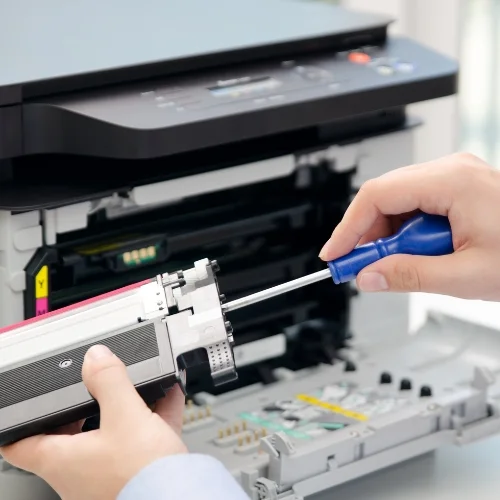Printer Maintenance: How to Keep Your Printer Running Smoothly
Printers are often taken for granted—until they stop working. Whether you’re using a printer at home, in a busy office, or as part of a commercial setup, regular maintenance is the key to long-term performance and reliability. In this blog, we’ll walk you through everything you need to know about printer maintenance: why it matters, what tasks to perform, and how often to do them.

Why Printer Maintenance Is Important
Printers, like any mechanical device, experience wear and tear. Ink can dry, dust can build up, and parts can fail without warning. Without regular maintenance:
Print quality may deteriorate.
Hardware components may wear out prematurely.
Printing may become inconsistent or fail entirely.
Downtime and repair costs can increase significantly.
Routine maintenance helps prevent breakdowns, improves print quality, and extends the life of your printer—saving you money and frustration in the long run.
Essential Printer Maintenance Tasks
1. Clean the Exterior and Interior
How Often: Monthly
Dust, fingerprints, and debris can accumulate on your printer. Use a soft, lint-free cloth slightly dampened with water to clean the outside. For the interior:
Turn off and unplug the printer.
Open the printer and gently remove any dust or particles using a soft brush or compressed air.
Avoid touching the drum or rollers with your fingers.
2. Clean the Print Heads
How Often: Every 1–2 months or when print quality declines
For inkjet printers, clogged print heads are a common issue. Most printers offer a built-in utility for this:
Run the printer’s software cleaning tool.
If the problem persists, manually clean the print head with a lint-free cloth and distilled water.
3. Replace Ink or Toner Cartridges
How Often: As needed
Always monitor ink or toner levels. Replacing them before they’re completely empty can prevent damage to the print head or internal components.
Tips:
Use genuine or manufacturer-approved cartridges.
Avoid refilling cartridges too many times, as it may cause leakage or poor print quality.
4. Check and Replace Worn Parts
How Often: Every 6–12 months (depending on usage)
Laser printers have consumable parts like the drum unit, rollers, and fuser assembly. Refer to your printer’s maintenance schedule or print count to determine when these need replacement.
5. Keep Software and Drivers Updated
How Often: Quarterly
Manufacturers often release updates to improve printer performance or fix bugs:
Visit the manufacturer’s website.
Download and install the latest firmware and drivers.
6. Use the Printer Regularly
How Often: Weekly
Infrequent use can cause ink to dry out and clog the nozzles in inkjet printers. Print a test page weekly to keep ink flowing.
Environmental Tips for Printer Longevity
Store in a Cool, Dry Area: Avoid direct sunlight or humid environments.
Keep Covered When Not in Use: Especially helpful in dusty environments.
Use High-Quality Paper: Cheap or inappropriate paper can cause jams or wear out rollers faster.
Signs Your Printer Needs Maintenance
If you notice any of the following, it’s time for a maintenance check:
Faded, blurry, or streaky prints
Frequent paper jams
Slow printing speed
Error messages or warning lights
Unusual noises during operation
When to Call in the Pros
While most maintenance tasks are easy to do yourself, some situations require professional help:
Complex hardware replacements
Persistent error codes
Electrical issues
Firmware malfunctions
Professional servicing can help diagnose issues you might overlook and ensure your printer is running like new.
Conclusion
Routine printer maintenance is simple but powerful. Just a few minutes of care each month can dramatically improve performance, reduce downtime, and extend the life of your machine. Whether you’re managing a single desktop printer or a fleet of networked devices, consistent maintenance is a smart, cost-effective habit.
Need help maintaining your printer? Contact our expert technicians for a comprehensive service today!